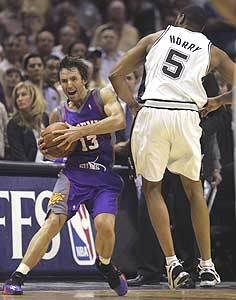 General
General  General Archive
General Archive  Rules Were Made To Be ... Enforced
Rules Were Made To Be ... Enforced

It is outrageous. It is unfair. And it was a single decision that very well could cost the Phoenix Suns an NBA Championship. Yet, Stu Jackson did the right thing with a bad rule.
As Robert Horry took his frustration out on Steve Nash with a body check into the scorer's table in a game already decided, it was evident the Suns were sick of being bullied. Like any good teammates, Amare Stoudemire and Boris Diaw came to the aid of their floor general under attack. The problem? They were not in the game at the time. And that, according to current NBA rules, is a big no-no.
David Stern, along with his pals Larry, Magic, and Michael, has built the NBA into what it is today. Love him or hate him, he has done so with innovation, creativity, and under strict leadership. This combination of attributes has led to many of the league's successes, most notably the best player and team salary structures of any of the major sports leagues. Perhaps one of his biggest pet peeves over the years has been his determination not to cross the fine line between entertainment and sideshow. A big part of making sure that would not happen was to make blatantly clear that fighting would be severely scrutinized and punishable. With so many spectators close to the action these days, a bench clearing brawl in the NBA could involve fans much more easily than in football and baseball. In addition, the stigma associated with fighting could lower perception of the league he worked so hard to build. The great one himself, Wayne Gretzky, often stated that with fighting as it was in hockey, it would always be fourth in line in popularity of the major sports.
Despite careful planning and proactive warnings, though, his worst fears became a reality with the infamous Pacers-Pistons brawl erupting into the Auburn Hills stands. It was a dark day for Stern, as he levied heavy punishments on all that entered the fracas. At the core of the NBA's rules with altercations is, understandably, to limit the players involved. The less people swinging, the less of a chance the incident gets out of control. Therefore, if you leave that bench buddy, you get tomorrow off.
On the surface, it sounds like a great idea. At its core, though, there is one major flaw. Almost always, the players (at least initially) leaving their bench will be of the team that has been victimized. Human nature, especially as a leader of a team, will be to get out there and help your teammate. The pressure of a playoff series just accentuates that desire.
What happened in Game #4 between the Suns and the Spurs was a train wreck waiting to happen. A role player takes out a star (and himself for two games) and the team on the defensive suffers more than the agitating team. But rules are rules.
In baseball, no one on this planet knows what to expect when a pitcher throws at a batter. He can be warned. He can be ejected. He can be suspended. He can appeal that suspension. Or, in a lot of cases, nothing at all happens.
In football, fighting might be broken up by teammates. It may result in a 15-yard penalty. The players may even get ejected.
But in basketball, there is no gray area. If you leave your bench, you are done for a game. You know it. I know it. My mother may even know it. EVERYONE knows it. I accept that it is a travesty that the Suns may not advance because of the rule. But it would be a much bigger travesty if the rule were altered because of the significance of the series. And it would leave so much open for interpretation for the remainder of the playoffs.
David Stern ran into a similar problem last year with the Western Conference's two best teams squaring off before the finals. At the end of the year, he corrected the problem. He should do likewise this year. However, as the Spurs were last year, the Suns may be a sacrificial lamb.
- NBA Announces 2013-2014 Schedule
- Browns Ink Sharknado
- Sharknado A No-Show For Rookie Camp
- Trent Richardson Out Until Training Camp
- Browns Sign Brandon Jackson
- Carrasco Suspended Eight Games
- Browns Add to Wide Receiver Depth with David Nelson
- Browns Need to Learn from Past Draft Mistakes
- Browns Release Chris Gocong and Usama Young
- Browns Missing on Grimes Disappointing, But Not The End
The TCF Forums
- Jackets 2014
bac5665 (Tuesday, January 21 2014 11:55 PM) - Who is the worst owner in Cleveland Sports
mattvan1 (Tuesday, January 21 2014 10:05 PM) - 2015 Recruiting
furls (Tuesday, January 21 2014 7:43 PM) - Devone Bess
Spin (Tuesday, January 21 2014 5:35 PM) - 2014 Recruiting
jclvd_23 (Tuesday, January 21 2014 4:38 PM) - Official- Browns Coach Search/Rumors
googleeph2 (Tuesday, January 21 2014 3:42 PM) - Movies coming out
rebelwithoutaclue (Tuesday, January 21 2014 12:56 PM) - The 2014 Offseason Thread
Larvell Blanks (Tuesday, January 21 2014 12:25 PM) - Chris Grant's first 3 drafts
Kingpin74 (Tuesday, January 21 2014 10:13 AM) - Mike Brown
YahooFanChicago (Monday, January 20 2014 11:15 PM)



